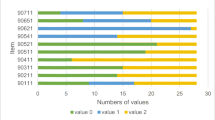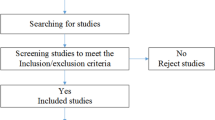Abstract
Numerous studies have shown that teaching the history and philosophy of science (POS) can help improve senior high school students’ scientific literacy. The history of science is usually taught in school science lessons by reference to particular cases, experiments, and scientists. In contrast, the POS — that is, the study of general and fundamental questions regarding the nature of science (NOS) — is often embedded within lessons, is considered difficult to teach, and is sometimes hidden from students. This research analyses the overlap between the conceptualisations of the NOS and the POS. The paper also reports on a study that used “explicit” pedagogical methods to teach topics related to the POS to Chinese senior high school students. The empirical results, which are supported by a theoretical framework that adopts the family resemblance approach to the NOS, show that students who participated in this POS course significantly improved their scientific literacy and their understanding of the relationships among science, technology, and society. The POS topics in this course helped students better understand the cognitive-epistemic system in the NOS. The findings of this small-scale study have broader implications for the way in which the POS is taught in high school education.


Similar content being viewed by others
Data Availability
Not applicable.
Code Availability
Not applicable.
References
Abd-El-Khalick, F. (2012). Examining the sources for our understandings about science: Enduring conflations and critical issues in research on nature of science in science education. International Journal of Science Education, 34(3), 353–374.
Abd-El-Khalick, F. (2005). Developing deeper understandings of nature of science: The impact of a philosophy of science course on preservice science teachers’ views and instructional planning. International Journal of Science Education, 27(1), 15–42.
Aikenhead, G. S., & Ryan, A. G. (1992). The development of a new instrument: ‘Views on Science—Technology—Society’ (VOSTS). Science Education, 76(5), 477–491.
Akerson, V. L., Abd-El-Khalick, F., & Lederman, N. G. (2000). Influence of a reflective explicit activity-based approach on elementary teachers’ conceptions of nature of science. Journal of Research in Science Teaching: The Official Journal of the National Association for Research in Science Teaching, 37(4), 295–317.
Allchin, D. (2004). Should the sociology of science be rated X? Science Education, 88(6), 934–946.
Allchin, D. (2011). Evaluating knowledge of the nature of (whole) science. Science Education, 95(3), 518–542.
Arabatzis, T., & Schickore, J. (2012). Ways of integrating history and philosophy of science. MIT Press.
Bentley, M., Fleury, S. C., & Garrison, J. (2007). Critical constructivism for teaching and learning in a democratic society. Journal of Thought, 42(3–4), 9–22.
Bialystok, L., Norris, T., & Pinto, L. E. (2019). Teaching and learning philosophy in Ontario high schools. Journal of Curriculum Studies, 51(5), 678–697.
Burian, R. M. (2001). The dilemma of case studies resolved: The virtues of using case studies in the history and philosophy of science. Perspectives on Science, 9(4), 383–404.
Driver, R., Leach, J., & Millar, R. (1996). Young people’s images of science. UK: McGraw-Hill Education.
Eflin, J. T., Glennan, S., & Reisch, G. (1999). The nature of science: A perspective from the philosophy of science. Journal of Research in Science Teaching, 36(1), 107–116.
Erduran, S., Dagher, Z. R., Erduran, S., & Dagher, Z. R. (2014). Reconceptualizing nature of science for science education (pp. 1–18). Netherlands: Springer.
Fetters, M. D., Curry, L. A., & Creswell, J. W. (2013). Achieving integration in mixed methods designs—Principles and practices. Health Services Research, 48(6pt2), 2134–2156.
Flusser, V. (2005). Thought and reflection. Flusser Studies, 1(3), 1–7.
Fouad, K. E., Masters, H., & Akerson, V. L. (2015). Using history of science to teach nature of science to elementary students. Science & Education, 24(9–10), 1103–1140.
Fuller, S. (2019). Philosophy of science and its discontents. Routledge.
Gallagher, J. J. (1991). Prospective and practicing secondary school science teachers’ knowledge and beliefs about the philosophy of science. Science Education, 75(1), 121–133.
Höttecke, D., & Allchin, D. (2020). Reconceptualizing nature-of-science education in the age of social media. Science Education, 104(4), 641–666.
Höttecke, D., & Silva, C. C. (2011). Why implementing history and philosophy in school science education is a challenge: An analysis of obstacles. Science & Education, 20(3–4), 293–316.
Irzik, G., & Nola, R. (2011). A family resemblance approach to the nature of science for science education. Science & Education, 20(7–8), 591–607.
Irzik, G., & Nola, R. (2014). New directions for nature of science research International handbook of research in history, philosophy and science teaching (pp. 999–1021). Springer.
Kampourakis, K. (2016). The “general aspects” conceptualization as a pragmatic and effective means to introducing students to nature of science. Journal of Research in Science Teaching, 53(5), 667–682.
Kaya, E., & Erduran, S. (2016). From FRA to RFN, or how the family resemblance approach can be transformed for science curriculum analysis on nature of science. Science & Education, 25(9–10), 1115–1133.
Kelly, G. J., & Licona, P. (2018). Epistemic practices and science education History, philosophy and science teaching (pp. 139–165). Springer.
Kötter, M., & Hammann, M. (2017). Controversy as a blind spot in teaching nature of science. Science & Education, 26(5), 451–482.
Kvarme, L. G., Helseth, S., Sørum, R., Luth-Hansen, V., Haugland, S., & Natvig, G. K. (2010). The effect of a solution-focused approach to improve self-efficacy in socially withdrawn school children: A non-randomized controlled trial. International Journal of Nursing Studies, 47(11), 1389–1396.
Ladyman, J. (2012). Understanding philosophy of science. Routledge.
Lampert, Y. (2020). Teaching the nature of science from a philosophical perspective. Science & Education, 29(5), 1417–1439.
Laudan, L. (2004). The epistemic, the cognitive, and the social. Science, Values, and Objectivity, 14–23.
Lederman, N. G. (2013). Nature of science: Past, present, and future. In Handbook of research on science education (pp. 831–879). Routledge.
Lederman, N. G., & Lederman, J. S. (2014). Research on teaching and learning of nature of science Handbook of research on science education (Vol. II, pp. 614–634). Routledge.
Lederman, N. G., & Lederman, J. S. (2019). Teaching and learning nature of scientific knowledge: Is it Déjà vu all over again? Disciplinary and Interdisciplinary Science Education Research, 1(1), 6.
Lederman, N. G., Lederman, J. S., & Antink, A. (2013). Nature of science and scientific inquiry as contexts for the learning of science and achievement of scientific literacy. Online Submission, 1, 138–147.
Lehavi, Y., & Eylon, B.-S. (2018). Integrating science education research and history and philosophy of science in developing an energy curriculum History, philosophy and science teaching (pp. 235–260): Springer
Malaterre, C., Chartier, J.-F., & Pulizzotto, D. (2019). What is this thing called philosophy of science? A computational topic-modeling perspective, 1934–2015. HOPOS: The Journal of the International Society for the History of Philosophy of Science, 9(2), 215–249.
Matthews, M. R. (2014). Science teaching: The contribution of history and philosophy of science. Routledge.
Matthews, M. R. (2017). History, philosophy and science teaching: New perspectives. Springer.
McComas, W. F. (2017). Understanding how science works: The nature of science as the foundation for science teaching and learning. School Science Review, 98(365), 71–76.
Mellado, V., Ruiz, C., Bermejo, M. L., & Jiménez, R. (2006). Contributions from the philosophy of science to the education of science teachers. Science & Education, 15, 419–445.
Mudavanhu, Y., & Zezekwa, N. (2017). The views of nature of science expressed by in-service teachers who were learning history and philosophy of science. Journal of Educational and Social Research, 7(3), 39.
Okan, B., Kaya, E. (2022). Exploring the inclusion of nature of science in Turkish middle school Science textbooks. Science & Education. https://doi.org/10.1007/s11191-022-00371-x
Okasha, S. (2016). Philosophy of science: Very short introduction. Oxford University Press.
Onwuegbuzie, A. J., Frels, R. K., & Hwang, E. (2016). Mapping Saldana’s coding methods onto the literature review process. Journal of Educational Issues, 2(1), 130–150.
Osborne, J. (2006). Towards a science education for all: The role of ideas, evidence and argument. https://research.acer.edu.au/research_conference_2006/9
Owen, R., Macnaghten, P., & Stilgoe, J. (2012). Responsible research and innovation: From science in society to science for society, with society. Science and Public Policy, 39(6), 751–760.
Piccolino, M., & Bresadola, M. (2013). Shocking frogs: Galvani, Volta, and the electric origins of neuroscience. Oxford University Press.
Richards, J. C., & Schmidt, R. (2002). Longman dictionary of applied linguistics and language teaching (p. 327). Harlow: Longman.
Ross, D. G. (2017). The role of ethics, culture, and artistry in scientific illustration. Technical Communication Quarterly, 26(2), 145–172.
Rudge, D. W., & Howe, E. M. (2009). An explicit and reflective approach to the use of history to promote understanding of the nature of science. Science & Education, 18(5), 561–580.
Saldaña, J. (2021). The coding manual for qualitative researchers. SAGE.
Schwartz, R. S., Lederman, N. G., & Abd-el-Khalick, F. (2012). A series of misrepresentations: A response to Allchin’s whole approach to assessing nature of science understandings. Science Education, 96(4), 685–692.
Shi, X. (2021). Using explicit teaching of philosophy to promote understanding of the nature of science: a case study from a Chinese high school. Science & Education, 30(2), 409–440.
Smith, M. U., Lederman, N. G., Bell, R. L., McComas, W. F., & Clough, M. P. (1997). How great is the disagreement about the nature of science: A response to Alters. Journal of Research in Science Teaching: The Official Journal of the National Association for Research in Science Teaching, 34(10), 1101–1103.
Valladares, L. (2021). Scientific literacy and social transformation. Science & Education, 30(3), 557–587.
Vaismoradi, M., Jones, J., Turunen, H., & Snelgrove, S. (2016). Theme development in qualitative content analysis and thematic analysis. Journal of Nursing Education and Practice, 6(5), 6–7.
Van Driel, J. H., De Vos, W., Verloop, N., & Dekkers, H. (1998). Developing secondary students’ conceptions of chemical reactions: The introduction of chemical equilibrium. International Journal of Science Education, 20(4), 379–392.
Wittgenstein, L. (2003). Ludwig Wittgenstein. Rowman & Littlefield.
Author information
Authors and Affiliations
Corresponding author
Ethics declarations
Conflict of Interest
The author declares no conflict of interest.
Additional information
Publisher's Note
Springer Nature remains neutral with regard to jurisdictional claims in published maps and institutional affiliations.
Rights and permissions
Springer Nature or its licensor (e.g. a society or other partner) holds exclusive rights to this article under a publishing agreement with the author(s) or other rightsholder(s); author self-archiving of the accepted manuscript version of this article is solely governed by the terms of such publishing agreement and applicable law.
About this article
Cite this article
Shi, X. The Value of the Philosophy of Science in Senior High School Science Education from the Perspective of the Nature of Science. Sci & Educ 32, 1613–1636 (2023). https://doi.org/10.1007/s11191-023-00451-6
Accepted:
Published:
Issue Date:
DOI: https://doi.org/10.1007/s11191-023-00451-6




